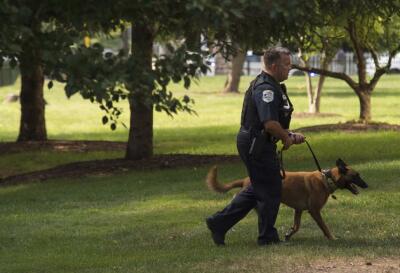Christian band to get back $53,000 seized by Oklahoma police

Funds worth $53,000, raised by a foreign Christian band for charity but was seized by Oklahoma police in February, will be returned as soon as possible.
According to The Washington Post, Muskogee County District Attorney Orvil Loge dropped on Monday the civil and criminal charges filed against Eh Wah, the volunteer manager for Burmese Christian band Klo & Kweh Music Team, whose car the cash was found.
"I looked at the case and met with the officers, and determined that we would not be able to meet the burden of proof in the criminal case and in the civil case," Loge said.
The group was on tour in the United States and had covered 19 cities at the time Eh Wah was apprehended in Oklahoma. He was stopped on Feb. 27 in Muskogee County due to a broken tail light, and the officers reportedly bombarded him with questions. The report says that a sniffing dog was subsequently brought over, and $53,000 in cash was found in his car: $33,000 from ticket sales, most of it meant to be donated for a Christian college in Burma; $1,000 donated for a Thai orphanage; $8,000 from gift and souvenir sales; $2,000 for the band's incidental expenses while on tour; plus $9,000 inserted in a gift bag given by his friends and family. No drugs or weapons were found.
The officer's affidavit described Eh Wah's statement as "inconsistent stories." He was taken to the police station for more questioning and was told he was going to jail. The police apparently didn't believe -- or didn't want to believe -- his explanation, even after they spoke to Saw Marvellous Soe, one of the band leaders, through a phone call. They seized all the cash, totalling to $53,249, and labeled the receipt as "possession of drug proceeds." They then let him go.
Dan Alban, legal counsel for Eh Wah and a lawyer at the Institute for Justice, said that the deputies gave back a $300 cheque written for his client.
"If they really thought these were drug proceeds and they thought he was a drug trafficker, why would they give back a check that they thought was drug proceeds?" said Alban. "If the real purpose of the stop was to increase revenue, there's no point in keeping the check because they can't cash the check."
The Washington Post explained that this practice is called civil asset forfeiture, in which authorities can seize cash and other assets from a person based on suspicion of wrongdoing, and they can keep those items they seized whether or not the person is convicted of a crime. To get the items back, the suspected person needs to prove that they're innocent rather than the authorities trying to prove the person is guilty. Oklahoma, according to the report, is one of states that is most permissive of forfeitures -- their laws do not required a conviction to seize property. Innocent owners are protected poorly, and there is even a statute that says that all the proceeds of forfeitures would go to law enforcement.
"We thought America was the best in the world," Marvelous said. "But unfortunately this happened, and it made us [think] like American police are the same as our police in Burma."
Eh Wah's camp filed a complaint, after which the district attorney decided to drop the charges filed against Eh Wah and return the money.
 Christians don't have to affirm transgenderism, but they can’t express that view at work: tribunal
Christians don't have to affirm transgenderism, but they can’t express that view at work: tribunal Archaeology discovery: Medieval Christian prayer beads found on Holy Island
Archaeology discovery: Medieval Christian prayer beads found on Holy Island Presbyterian Church in America votes to leave National Association of Evangelicals
Presbyterian Church in America votes to leave National Association of Evangelicals Over 50 killed in 'vile and satanic' attack at Nigerian church on Pentecost Sunday
Over 50 killed in 'vile and satanic' attack at Nigerian church on Pentecost Sunday Ukrainian Orthodox Church severs ties with Moscow over Patriarch Kirill's support for Putin's war
Ukrainian Orthodox Church severs ties with Moscow over Patriarch Kirill's support for Putin's war Islamic State kills 20 Nigerian Christians as revenge for US airstrike
Islamic State kills 20 Nigerian Christians as revenge for US airstrike Man who served 33 years in prison for murder leads inmates to Christ
Man who served 33 years in prison for murder leads inmates to Christ


 Nigerian student beaten to death, body burned over ‘blasphemous’ WhatsApp message
Nigerian student beaten to death, body burned over ‘blasphemous’ WhatsApp message 'A new low': World reacts after Hong Kong arrests 90-year-old Cardinal Joseph Zen
'A new low': World reacts after Hong Kong arrests 90-year-old Cardinal Joseph Zen Iran sentences Christian man to 10 years in prison for hosting house church worship gathering
Iran sentences Christian man to 10 years in prison for hosting house church worship gathering French Guyana: Pastor shot dead, church set on fire after meeting delegation of Evangelicals
French Guyana: Pastor shot dead, church set on fire after meeting delegation of Evangelicals ‘Talking Jesus’ report finds only 6% of UK adults identify as practicing Christians
‘Talking Jesus’ report finds only 6% of UK adults identify as practicing Christians Mission Eurasia ministry center blown up in Ukraine, hundreds of Bibles destroyed: 'God will provide'
Mission Eurasia ministry center blown up in Ukraine, hundreds of Bibles destroyed: 'God will provide' Church holds service for first time after ISIS desecrated it 8 years ago
Church holds service for first time after ISIS desecrated it 8 years ago Burger King apologizes for 'offensive campaign' using Jesus' words at the Last Supper
Burger King apologizes for 'offensive campaign' using Jesus' words at the Last Supper Uganda: Muslims abduct teacher, burn him inside mosque for praying in Christ’s name
Uganda: Muslims abduct teacher, burn him inside mosque for praying in Christ’s name